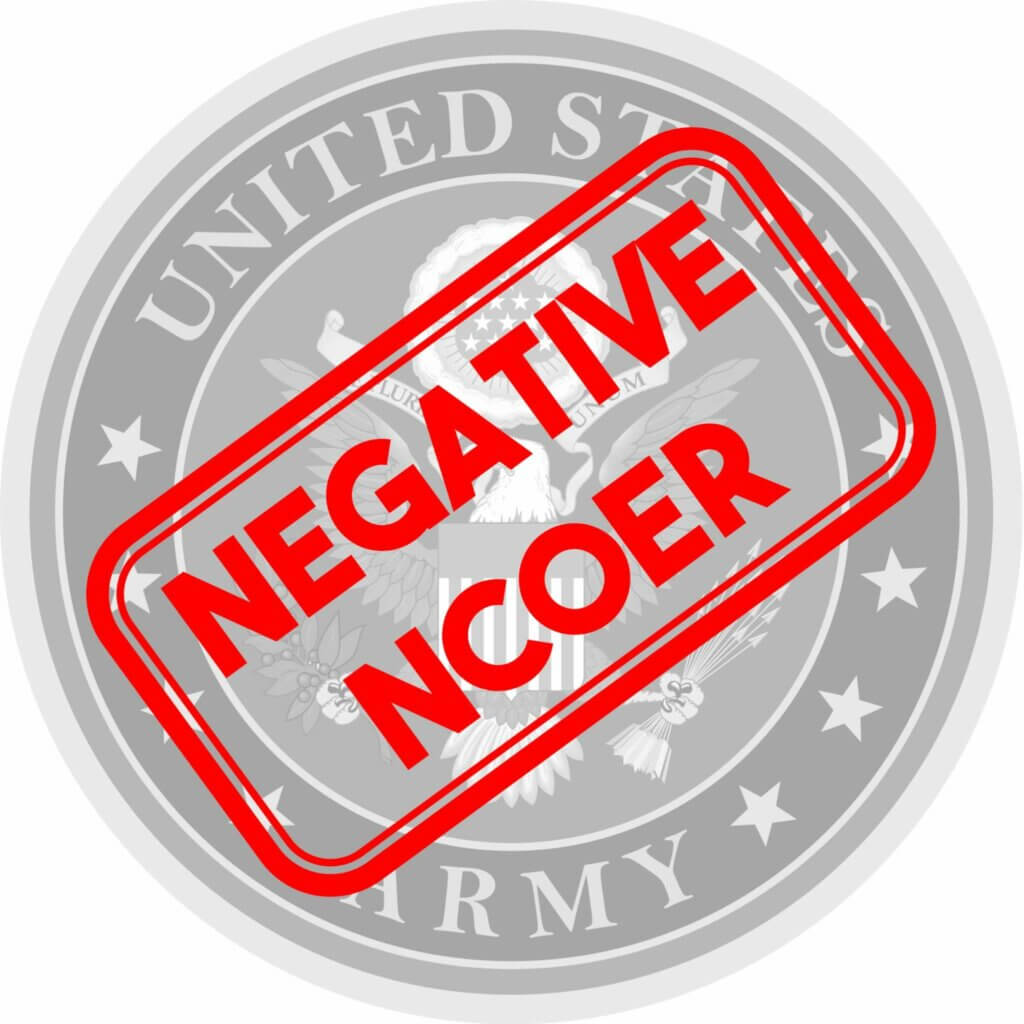If you receive an NCOER, or Noncommissioned Office Evaluation Report Form with negative comments or a “no” block check, the impact can be devastating to your career. You need to protect your future and submit a persuasive appeal. Here’s what you need to know about negative NCOERs and our tips for responding.
The first and most obvious impact of your NCOER is on your promotability. If you have a negative NCOER, your chances of promotion are decreased. The Army also uses NCOERs as a basis for school selection and future assignments. Frankly, the NCOER is probably the most important document in your Official Military Personnel File (OMPF), because it is reviewed by selection and promotion boards and clearly represents the NCO’s performance and potential to board members.
If you receive a negative or “bad” NCOER, you should immediately consult AR 623-3, Chapter 4. When you choose to respond to your negative NCOER, here are our tips for submitting the most persuasive appeal.

The reason you received a negative or “bad” NCOER is that your supervisor believes that your performance during the rating period was unsatisfactory. In your NCOER Appeal, it is important that you confront those allegations and the evidence against you. There are three common ways to respond to allegations based on our “best practices.”
First, you can accept the allegations as true and simply hope for the best outcome. This most commonly happens when the evidence against you is clear. (For example, you sent inappropriate text messages to someone, and your command has those text messages, and they are including a negative rating on your NCOER because of it.)
Second, you can dispute the allegations but not make a statement. This most commonly happens when the evidence against you is unclear, but anything you say about what happened could make things worse. (For example, someone claims you said something inappropriate to them, there is no hard evidence or witnesses, but you know that you actually did say the inappropriate thing.)
Finally, you can dispute the allegations with a statement and evidence. This most commonly happens when the evidence against you is unclear, and your statement could change things. (For example, someone claims you said something inappropriate to them, there is no hard evidence or witnesses, and you know you did not say the inappropriate thing.)
Although the team at Military Justice Guides are not lawyers, and cannot give you legal advice, we can say from experience that these are the best ways to address the allegations that you are facing in your NCOER Appeal. There are many ways to respond to a negative NCOER. The key is to decide on a strategy and stick to your message. Provide information and evidence that helps your command understand your position and, hopefully, resolve your case in the most lenient way.
When you receive a negative NCOER, you might think that it is all your leadership or command cares about. In our experience, however, it’s important that your leadership understands all the good things you have done. You need to show them that what led to your negative NCOER was out of character for you. You should include positive details about yourself and your career. Show them your true colors.
We always encourage our clients to detail their careers. Talk about your assignments and what you learned from them. List your training opportunities. You should definitely include lots of information about any awards you may have won or been nominated for, even if they are “small” awards. Explain your successes, including any major projects, decorations, recognitions, etc. Explain that, because you have been successful in the past, you know you will be successful in the future.
Perhaps the most powerful way to respond to a negative NCOER is through character letters. Character letters allow you to ask other people, like your co-workers, to stand up for you and help you show your true character. In any character letter, you want the author to talk about three things: how they know you, what they think about you, and what your best character traits are. Character letters are an excellent way for you to show your leadership how you contribute to the military community and how other people think you will succeed in the future.
When you ask for character letters from others, you should explain the allegations against you so that they understand why you need their support. You can also provide them with a Character Letter Template, which is a good way to show that you are planning to submit a professional rebuttal and need help.
Character letters are truly the best way to show that others support you and will help you in the future.
The tips above should help you write a persuasive appeal to your negative NCOER. Our products can also help. If you are interested, please feel free to read more on our website or purchase a template below:

Our NCOER Appeal Template is written by experienced military officers. When you purchase this template, you will be able to download and get started!
Military Justice Guides and MilitaryJusticeGuides.com are not law firms, nor do our employees act as legal counsel. MilitaryJusticeGuides.com provides an online portal to give users a general understanding of military law and to provide an automated software solution to individuals who choose to prepare their own documents. MilitaryJusticeGuides.com Services may also include a review of your answers for completeness, spelling, grammar, and for internal consistency of names, addresses and the like. At no time do we review your answers for legal sufficiency, draw legal conclusions, provide legal advice, opinions or recommendations about your legal rights, remedies, defenses, options, selection of forms, or strategies, or apply the law to the facts of your particular situation. We are not a law firm and may not perform services performed by an attorney. Military Justice Guides and MilitaryJusticeGuides.com, its related Services, and its forms or templates are not a substitute for the advice or services of an attorney.
